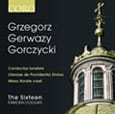The Blossoming Vine: Italian Maestri in Poland
Works by Asprilio Pacelli (1570–1623), Vincenzo Bertolusi (c.1550-1608), and Giovanni Francesco Anerio (c.1567–1630)
The Sixteen; Eamonn Dougan, cond.
CORO Records COR16123 (rel. April 28, 2014)
 Grzegorz Gerwazy Gorczycki
Grzegorz Gerwazy Gorczycki
Grzegorz Gerwazy Gorczycki (1665–1734): Conductus funebris; Litaniae de Providentia Divina; Missa Rorate caeli: In virtute tua, O rex gloriae, Illuxit sol, Sepulto Domino
The Sixteen; Eamonn Dougan, cond.
CORO Records COR16130 (rel. March 30, 2015)
British early music powerhouse ensemble the Sixteen and their associate conductor Eamonn Dougan have embarked on a successful “Polish series” of recordings for the group’s CORO record label. The series was launched with a disc devoted to one of the most eminent composers of the Polish 17th century, Bartłomiej Pękiel (COR16110)—watch a video of the recording, including an interview of Dougan, on the Vimeo page of Culture.pl.
The second disc in the series, The Blossoming Vine, explores a selection of fascinating music composed by the Italian maestri recruited to at the Polish Court of Sigismund III Vasa in the 16th and early 17th centuries. BBC Music Magazine named the disc its “Choral & Song Choice – August 2014” and gave it 5 stars for both Performance and Recording.
Watch a video of the recording process on the Vimeo page of Culture.pl. Read an excerpt from a review of The Blossoming Vine by James Manheim via www.allmusic.com below:
The title of the present release comes from the biblical Song of Songs. The verse does not appear in any of the actual pieces recorded, but the concept might apply more generally to the music included: the three composers represented here were among dozens of Italian musicians imported to Poland by the ruler Sigismund III Vasa. Sigismund was a Catholic, an admirer of the Counter Reformation, and a figure who helped shape the flavor of Polish Catholicism as it has come down to the present day. The composers he hired were followers of Palestrina, and in at least one and probably two cases here actual students of the Roman master, but they were not untouched by later developments in Italian music (these pieces date from the early 17th century). There’s one imposing polychoral piece that wouldn’t have been out of place in the Gabrielis’ Venice (Asprilio Pacelli‘s Dum esset rex, track 14), and other works illustrate their texts, all of them connected with Mary in some way, with smaller antiphonal effects. the Sixteen bulks up to 17 singers or more here, and they deliver the rich, intricate sound that’s necessary for the style without losing the more intimate quality of the music from satellite center as compared to the Roman point of origin. The usual high standard of Sixteen engineering, here executed at the London church of St. Alban the Martyr, is deployed to especially nice effect. An excellent survey of music that will be unknown to most listeners other than the ones who can read the supplied Polish booklet notes.
The third disc in The Sixteen’s acclaimed series of Polish music explores the work of Grzegorz Gerwazy Gorczycki (1665–1734). Regarded as the outstanding Polish composer of the high baroque, Gorczycki studied in Prague and Vienna in his early years and returned to Kraków in 1690 where he took holy orders. He was appointed Magister capellae at Wawel Cathedral in 1698, a position he held until his death. Like his predecessor Bartłomiej Pękiel (COR16110), Gorczycki wrote in both stile antico and stile moderno; the works featured in this recording display his skill in both genres. The Missa Rorate shows his mastery of counterpoint and sensitivity to word-setting, as does Illuxit Sol in which Gorczycki revels in the rhetoric of the text, painting it with lush five-part string writing; Conductus Funebris, a four-movement work setting text from the Burial Service, marries his contrapuntal skills with a more emphatic, declamatory style, while in the Litania de Providentia Divinae, Gorczycki unleashes the full power of his invention as he paints the virtues of “Divine Providence” with a glowing palate of colours.
Below are some of the latest reviews of the third disc in the series, Grzegorz Gerwazy Gorczycki:
“The latest in The Sixteen’s fascinating Polish project… these performances are pristine, carefully blended and appositely devout in flavour.” The Sunday Times
“This is a gorgeous recording of some really lovely music… This is the third CD in The Sixteen’s exploration of early music from Poland – don’t miss them!” EARLY MUSIC REVIEW
[Sources: Muzyka 21 (May 2015 issue), thesixteen.com, allmusic.com, prestoclassical.co.uk]
